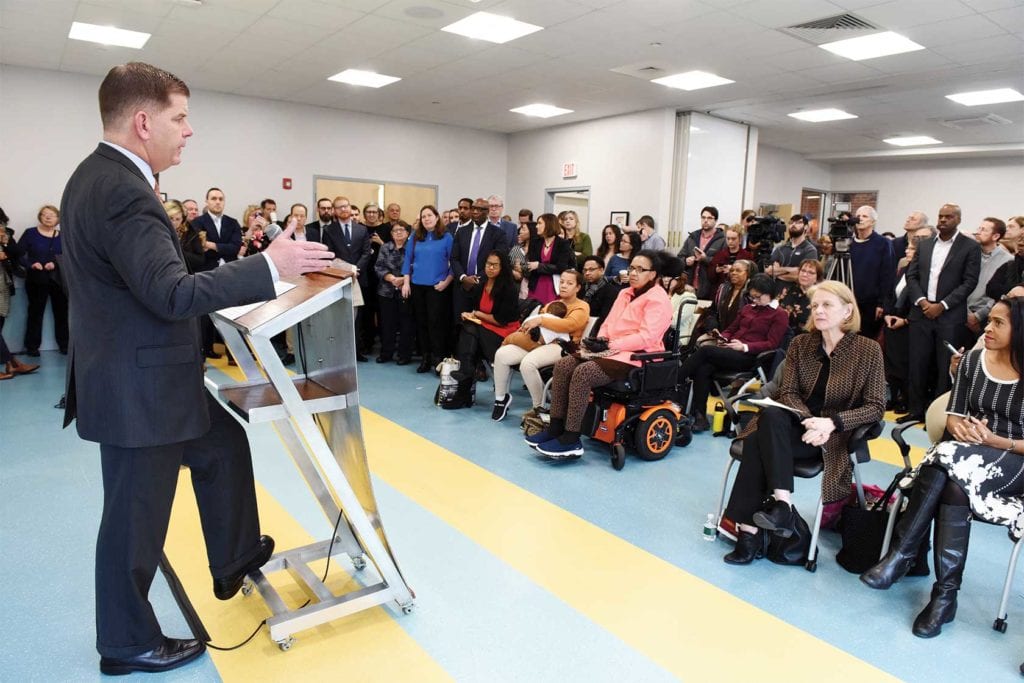Walsh announces $69m in housing funds
Money will go to 18 affordable Housing projects throughout city

On Feb. 7, Mayor Walsh announced $69 million in funding that city officials say will support construction of 936 affordable new units in Boston.
The allocation of funds, including $16 million from the Neighborhood Housing Trust, $16 million from the Community Preservation Fund and $37 million in federal and city funds managed by the Department of Neighborhood Development (DND), will help the city draw closer to its “Imagine Boston 2030” goal to create 69,000 new housing units by 2030, 20% of which are to be affordable.
Department of Neighborhood Development (DND) spokesman Alexander Sturke said the money will go toward 18 new affordable housing projects in neighborhoods throughout the city. It will also fund two citywide projects, including the preservation of 161 existing affordable units.
“All of that is impacting thousands of families and individuals that will then have the … opportunity to have affordable housing within the city,” said Sturke.
The Neighborhood Housing Trust funding comes from “linkage fees” paid by commercial developers building projects in excess of 100,000 square feet. The Community Preservation Fund was created by the Community Preservation Act approved by Boston voters in 2016, which places a 1% surcharge on Boston property taxes and directs the proceeds toward affordable housing, historic preservation and the maintenance of open space in the city.
Each project receiving the funding undergoes a long process before the city approves requests for allocation. Sturke said that the process started eight to 10 months ago, and dozens of communities submitted requests for proposals.
“This year we had a record number of requests and proposals that were submitted,” he added.
The Neighborhood Housing Trust and the Community Preservation Act each have an oversight committee, said Sturke. The individual committees vote on how much they want to fund specific projects.
The new funding will also advance two other housing programs, ONE+ Boston and Acquisition Opportunity. The ONE+ Boston mortgage program provides mortgage assistance as well as down payment assistance for first-time homebuyers who meet income guidelines.
The Acquisition Opportunity program allows nonprofits to purchase existing private-market rental units and make them permanently affordable, helping to prevent displacement of tenants at the hands of landlords who may raise rents sharply.
The Boston 2030 plan, said Sturke, outlines a future in which about 20% of the 69,000 proposed housing units are deed-restricted, amounting to nearly 15,000 more units of deed-restricted affordable housing. The plan was launched by Walsh in 2014 to accommodate projected growth in Boston’s population. City officials estimate 759,000 residents will live in Boston in 2030, up from 617,594 in 2010. The Boston 2030 plan focuses on increased housing production and the creation of affordable units to help prevent displacement.
In spite of the rapid pace of housing development since 2014, however, rents and housing prices in the private housing market have continued to rise in Boston.
The 1,097 units of housing announced last Friday stretch over Brighton, Chinatown, Dorchester, Hyde Park, Mattapan, Roxbury, Roslindale, Jamaica Plain, East Boston and West Roxbury. Many are intended for households earning no more than 60% of the Area Median Income (AMI), or $71,100 or less for a family of four.
Development for these units will start soon, and Sturke said that the goal is to finish development within the next two years. Development is not a straight line, however, and he noted that the timeline will vary on a project-by-project basis.






